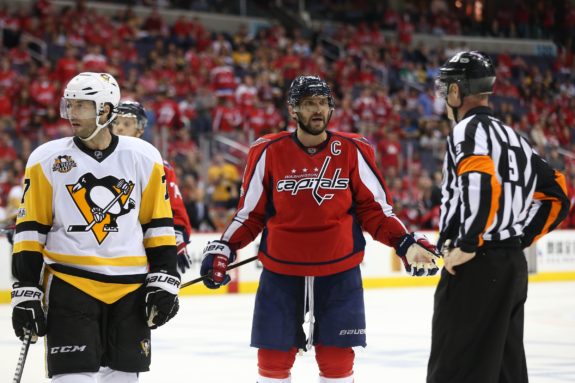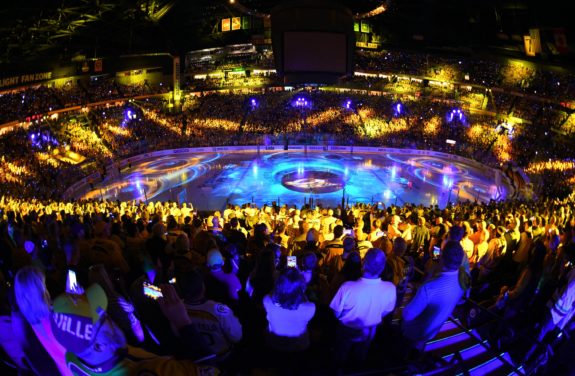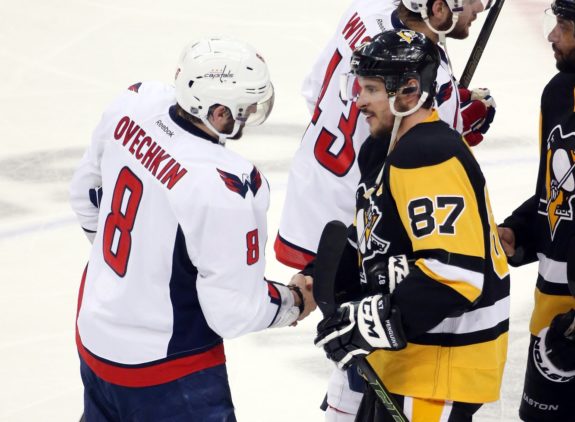As the 2017-18 National Hockey League season winds down and the Stanley Cup Playoffs approach, it is becoming increasingly apparent the current playoff format, introduced for 2013-14, is widely despised.
In an ideal world, there’d be a different format, no question about that. But, considering the current structure of the league and its constant deference to owners and the almighty dollar, the current system is a necessary evil – and an evil that, all things considered, really isn’t all that bad.
(*ducks*)
Well that’s not very nice now, is it?
NHL Playoff Format Illogical, Unloved
There are certainly some good arguments to back up the hate.
Notwithstanding the fact there was never really anything wrong with the old “one-versus-eight” setup, there are some pretty blatant logical conundrums the divisional format creates.
For instance, a conference’s top teams during the regular season are often forced to play each other in the first or second round. Look no further than the 2016-17 postseason for an example, when the Metropolitan Division’s top three seeds – three of the NHL’s top four teams during the regular season – were whittled down to one by round three. Shouldn’t the league reward the best teams? Shouldn’t it want them to go as far as possible?

There is also the (yet-unrealised) potential of the sixth-place team in a division finishing outside the playoffs, despite having more points than one or more divisional seeds in another division. Why should a team possessing a playoff-calibre record lose out on a postseason berth because they play in a good division? Why should the NHL be guaranteeing playoff positions in the first place?
I could go on, but you get the idea. This playoff format was deeply flawed even before it was implemented. After it was, these grievances were openly aired by fans, players and executives alike.
So, if no one seems to like it, then why doth the NHL persist?
Divisional Format Designed for Dollars
It all comes down to money.
The playoffs are a boon to the coffers of any organisation; people generally show up to watch a competitive team, but doubly so with a championship on the line. These people buy tickets (at a playoff markup), concessions and merchandise. Those not at the game can listen to it on the radio, watch it on television, or view it using an official streaming service (or other, more creative means, because goodness knows the NHL and Rogers can’t make a functional streaming service, no matter how many hundreds of dollars you give them), making advertisers take notice.
From politicians to celebrities, everyone wants to be a part of a Stanley Cup run. NHL organisations take advantage, raking in piles of cash for their owners.

But all of that is true of the playoffs in any professional sport.
So, what else is there for the NHL to tap?
NHL Attempting to Rekindle Rivalry
Rivalries, that’s what.
Some of the greatest moments in hockey history have come as the result of heated rivalries. The NHL is at its best when good teams that dislike each other play frequently, and the Stanley Cup Playoffs, featuring seven-game series and the sport’s highest stakes, is the perfect vehicle to deliver this perfect combination to fans – thereby also lining the pockets of team owners.
The divisional playoff format forces teams that play each other the most during the regular season – and therefore, in theory, that have the most bad blood between them – to meet in the playoffs.
Why Does the NHL Want Rivalries?
Sure, you could watch the Buffalo Sabres face the Minnesota Wild, but why not watch a rivalry? Especially if it’s augmented by playoff pressure – not to mention geographical closeness.
If any combination of the three Western Canadian teams ever get good and meet in the playoffs, it’ll be a near-guaranteed great time. Just look at what happens when the California teams get together. A postseason meeting between any two of the three teams in Eastern Canada would likewise be a gongshow. And surely we all remember the insane series between the Penguins and the Philadelphia Flyers from 2012.
As for the present day, I can honestly say some of the most entertaining hockey I’ve seen all season has been between the Florida Panthers and Tampa Bay Lightning. I’d absolutely love to see them in a playoff series.
Despite the best efforts of the NHL, these matchups haven’t materialised in a long, long time – if at all. But that’s no reason to give up on this format; the divisional structure of the playoffs makes it more likely we get matchups that are more likely to be memorable. Familiarity breeds contempt, and all that.
Simply put, rivalries are fun for the fans, make money for the owners and are a very effective marketing tool for the league. A win-win-win, if you will. The recent series between the Penguins and Washington Capitals have been must-watch hockey. A little earlier, who wasn’t dropping everything when the Chicago Blackhawks and Los Angeles Kings were facing off? Before that, there were the series pitting the Blackhawks against the Vancouver Canucks, as well as those between the Boston Bruins and Montreal Canadiens.
Parity Forces NHL to Force Rivalries
Now, I do realise some rivalries I just mentioned – and many others throughout history – were not between teams in the same division. Such rivalries were, thus, generated by a certain amount of luck. Both teams had to be good at the same time, then they had to meet in the playoffs – often more than once, and then they had to play hockey that was, in some way, memorable. Clearly, there’s a lot of chance involved in rivalry creation and maintenance.
Perhaps the most heated rivalry in my lifetime was between the Colorado Avalanche and the Detroit Red Wings, a rivalry that took hold despite the fact the teams played in different divisions. However, this was before the salary cap era, when teams like the Avalanche and Red Wings were able to spend several times the amount of many other squads. As such, they could afford better players, therefore making them better teams. With such an advantage over many of the other teams, it’s no surprise these two met five times in the playoffs between 1996 and 2002.
Going back further still, look at the most legendary rivalry of them all: the Canadiens versus the Toronto Maple Leafs. Prior to the NHL expanding in 1967, the teams were regular playoff foes, buoyed by favourable regulations enabling both organisations to consistently ice great teams, as well as the fact the league had only six teams at the time.
For better or worse, the NHL is now a league driven by parity. It simply cannot rely on teams consistently slotting into high playoff seeds, thereby enabling late-round matchups year after year. It can’t rely on teams consistently making the playoffs, for that matter. Heck, it can’t even rely on regular-season meetings between teams being meaningful.
Therefore, though the NHL is clearly trying to force fun, the divisional playoff format is a more reliable method of generating desirable, moneymaking matchups than letting said rivalries come about by pure happenstance. Even though this vision has yet to come to fruition, all it’ll take is one season with three or four prime playoff series to set the hockey world straight.
Divisional Format Best for Bottom Line
Thus, it’s not that this format is best for teams and it’s certainly not that this format is best for fans (though rivalries are a lot of fun); it’s simply that this format is best for those that run the league. Lest we forget, the structure of the NHL is designed to, almost exclusively, represent the interests of owners. Why else do we have a salary cap? Why else do we have an obscenely long preseason? Why else were NHL players not at the Olympics?
It’s all about the owners’ bottom lines.
Winning Solves a Lot of Problems
But let’s not kid ourselves here; it’s not as though teams are helpless in all this.
Sure, some teams who did well during the regular season will be out early, but isn’t the established measure of team quality playoff success? Besides, only one team wins the Stanley Cup – and only one team from each conference plays for it, so seven of eight teams are going to get knocked out at some point anyway. Good teams are going to have to face other good teams at some point, so why does it matter when?

And sure, very occasionally, the sixth-best team in a division might lose out on a playoff spot, despite having more points than one or more teams in another division. The simple solution? Don’t be sixth-best in your division. The divisional seed with less points had a completely different schedule, so it’s not exactly fair to compare the two. Besides, this discrepancy already exists between conferences, so why is it a big deal between divisions?
NHL Playoff Format Flawed, yet Functional
Look, there is never an easy road to the Stanley Cup; no team has a completely smooth ride – nor should they. The NHL already gives its teams the most level playing field of any major professional sports league. Does it really need to baby them more?
The playoff rules are flawed, sure; their primary function is to make the owners money – as is that of the NHL as a whole. You could certainly argue that other formats would make them money, too. But this is what they decided to go with, so this is what teams have to work with.
Every team starts the season knowing these rules; they didn’t exactly sneak up on anyone. Sure, there are viable alternatives out there. There are also some decidedly less so (despite being tonnes of fun). But I’d like to see a larger sample size with the current format, to give it a chance to do what it was originally intended to accomplish.
I feel it’s still too early to make a call on this playoff format. There are many, many reasons to take issue with the NHL, but I just don’t think this is one of them – yet.
So, until then, let’s all just sit back, relax and enjoy the best postseason in sports.